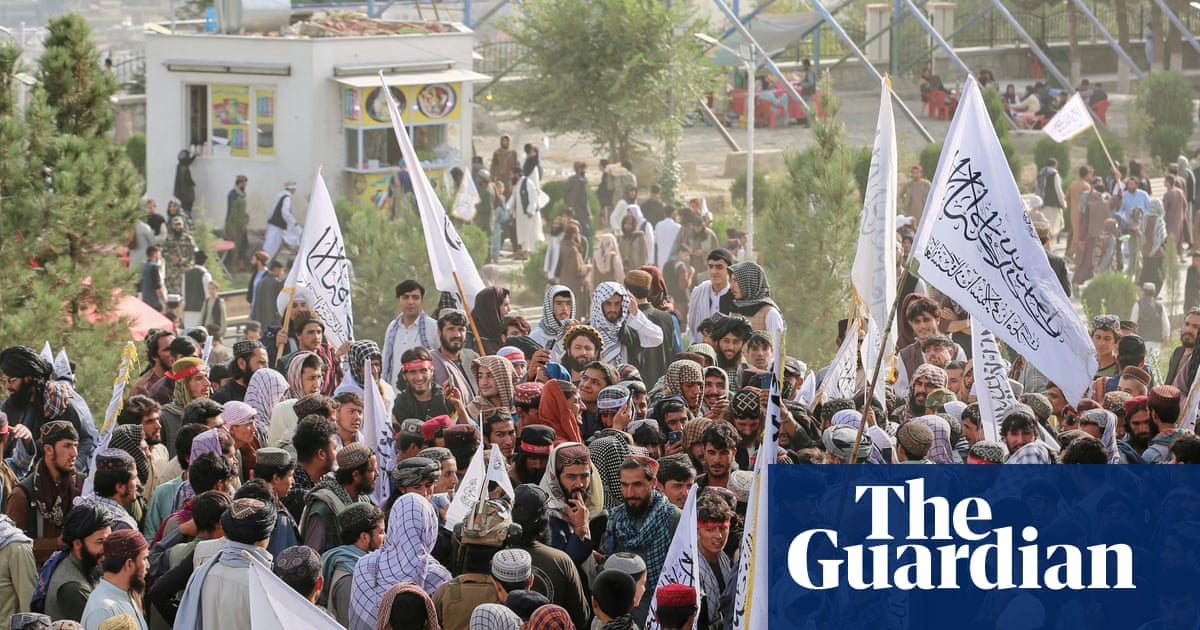Men celebrate fourth anniversary of Taliban’s return to power in Afghanistan | Afghanistan

Thousands of men gathered across Kabul on Friday to watch flowers being scattered from helicopters to mark the fourth anniversary of the Taliban’s return to power – a celebration that women were barred from attending.
Three of the six “flower shower” locations were already off-limits to women, who have been prohibited from entering parks and recreational areas since November 2022.
The Taliban seized Afghanistan on 15 August 2021 as the US and Nato withdrew their forces at the end of a two-decade war. Since then, they have imposed their interpretation of Islamic law on daily life, including sweeping restrictions on women and girls, based on edicts from their leader, Hibatullah Akhundzada.
Friday’s anniversary programme, which also included speeches from cabinet members, was only for men. An outdoor sports performance, initially expected to feature Afghan athletes, did not take place.
Rights groups, foreign governments and the UN have condemned the Taliban for their treatment of women and girls, who remain barred from many jobs, education beyond sixth grade and most public spaces.
Members of the United Afghan Women’s Movement for Freedom staged an indoor protest against Taliban rule on Friday in the north-eastern Takhar province.
“This day marked the beginning of a black domination that excluded women from work, education, and social life,” the movement said in a statement shared with Associated Press. “We, the protesting women, remember this day not as a memory, but as an open wound of history, a wound that has not yet healed. The fall of Afghanistan was not the fall of our will. We stand, even in the darkness.”
There was also an indoor protest in the Pakistani capital, Islamabad.
Afghan women held up signs that said “Forgiving the Taliban is an act of enmity against humanity” and “August 15th is a dark day.” They were fully veiled, except for their eyes, in the photographs.
Earlier in the day, the Taliban leader had said God would severely punish Afghans who were ungrateful for Islamic rule in the country, according to a statement.
Akhundzada, who is seldom seen in public, said in a statement that Afghans had endured hardships and made sacrifices for almost 50 years so that Islamic law, or sharia, could be established. Sharia had saved people from “corruption, oppression, usurpation, drugs, theft, robbery, and plunder”, he said.
“These are great divine blessings that our people should not forget and, during the commemoration of Victory Day, express great gratitude to Allah Almighty so that the blessings will increase,” Akhundzada said in comments shared on X.
“If, against God’s will, we fail to express gratitude for blessings and are ungrateful for them, we will be subjected to the severe punishment of Allah Almighty,” he said.
Last month, the international criminal court issued arrest warrants for Akhundzada and the chief justice, Abdul Hakim Haqqani, accusing them of crimes against humanity for the persecution of women and girls.
The ICC said there were “reasonable grounds to believe” they had ordered policies that deprived women and girls of “education, privacy and family life and the freedoms of movement, expression, thought, conscience and religion”.
This year’s anniversary celebrations are more muted than last year’s, when the Taliban staged a military parade at a US airbase, drawing anger from Donald Trump about the abandoned American hardware on display.
Afghanistan is also gripped by a humanitarian crisis made worse by the climate crisis, millions of Afghans expelled from Iran and Pakistan, and a sharp drop in donor funding.
Source link

